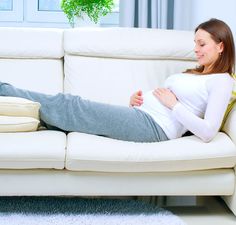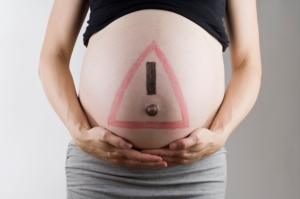You just made it through the first trimester of your pregnancy! Congratulations!
The second trimester – which lasts from the beginning of week 14 through the end of week 27- is for most women, the easiest of all three: the annoying symptoms of the first trimester usually disappear and you feel full of energy again! In addition, you will be less heavy, tired and anxious than during the third trimester…
The fact that you feel better doesn’t mean that nothing is going on! Your baby grows very fast during this period, and your body is working incessantly; thus you will notice many changes…
From all the symptoms you had during the first trimester (see here), many will disappear, other persist and some new will show up.
These symptoms usually disappear or ease during the second trimester:
These are symptoms that may persist:
- dizziness,
- bleeding of gums and nose,
- stuffy nose,
- vaginal discharge,
- headache,
- constipation,
- food cravings.
In this article we will focus on the symptoms that make their appearance during the second trimester, or that are somewhat different now. Here is what you can expect:
1) Backache
While back pain during the first trimester is mostly related to mild uterine cramping, as pregnancy progresses it’s caused by weight gain and the shift of your center of gravity as a result of the growing uterus. Thus, you gradually adjust your posture, which results in back pain or strain.
What can you do about it:
- avoid standing up for long periods of time,
- sit up straight; use a chair with good back support,
- sleep on your side; a pillow tucked between your legs may help,
- avoid carrying anything heavy,
- wear comfortable, low-heeled shoes with good arch support (read more here),
- a heating pad may provide some relief,
- if you feel really uncomfortable you may have a pregnancy massage.
If these measures don’t work or if the pain is strong, call your doctor, who can prescribe you a pain medication suitable for pregnancy.
2) Breast enlargement
 While the tenderness and swelling you experienced during the first trimester usually wear off by now, your breast will keep growing in preparation for breastfeeding. You may occasionally have some leakage of milk.
While the tenderness and swelling you experienced during the first trimester usually wear off by now, your breast will keep growing in preparation for breastfeeding. You may occasionally have some leakage of milk.
What can you do about it:
- wear a support bra; most likely you will need a bigger size,
- avoid lacy or wired bras.
3) Emotional changes
 As pregnancy progresses your body changes, so do your emotions! Your hormones certainly play a role, but it’s not only that: there is so much going on! So it’s natural to be worried or anxious at times, or to have mood swings (see here).
As pregnancy progresses your body changes, so do your emotions! Your hormones certainly play a role, but it’s not only that: there is so much going on! So it’s natural to be worried or anxious at times, or to have mood swings (see here).
You will most likely feel less tired and with more energy than before, so enjoy your pregnancy! Start preparing yourself for the coming of your baby, you can learn more about labor and delivery. Focus on healthy lifestyle regarding nutrition (read here) and physical activity (here). This may be also a good time to indulge yourself with a trip, or some vacations! (see here).
Some women experience increased sexual desire during this period of pregnancy (more info here); others may feel unattractive as the womb grows. Spoil yourself with some beauty treatments! (read more here).
Although mood swings are an inextricable part of pregnancy, keep in mind that if you feel constantly down or overwhelmed, if you have negative or suicidal thoughts, if you can’t go ahead with your daily life you must discuss it with your doctor.
4) Hair changes
 Hormonal changes during pregnancy favour hair growth. This may be great for the hair on your head, which usually becomes thicker, but not so great for hair growing on your face, arms or back!
Hormonal changes during pregnancy favour hair growth. This may be great for the hair on your head, which usually becomes thicker, but not so great for hair growing on your face, arms or back!
What can you do about it:
- Shaving, tweezing and waxing are safe options, although not always easy to implement as your belly grows!
- Regarding laser, electrolysis and depilatory creams the experts’ opinions are divided (read more here).
You may discuss with your doctor which is the best technique for you.
5) Hemorrhoids
 Most women will feel, at some point in their pregnancy, some soft lumps around the anus. In fact, hemorrhoids are swollen veins, which enlarge in pregnancy due to the increased pressure exerted by the growing uterus.
Most women will feel, at some point in their pregnancy, some soft lumps around the anus. In fact, hemorrhoids are swollen veins, which enlarge in pregnancy due to the increased pressure exerted by the growing uterus.
Although sometimes hemorrhoids are asymptomatic, the can be itchy, or painful; they may eventually bleed.
What can you do about it:
- avoid constipation – they will get worse,
- you may try a sitz bath (that is, you sit in warm water),
- if they are too uncomfortable, you may ask your doctor about a hemorrhoid ointment.
6) Leg cramps
 Painful leg muscle contractions typically affect the calf, foot or both; they are common during pregnancy, and usually occur at night.
Painful leg muscle contractions typically affect the calf, foot or both; they are common during pregnancy, and usually occur at night.
The exact cause of leg cramps isn’t clear; possible reasons include pregnancy hormones, compression of the legs’ blood vessels, and calcium or magnesium deficiency.
What can you do about it:
- regular physical activity might help prevent leg cramps; stretch your calf muscles before bedtime,
- stay hydrated,
- choose comfortable footwear with good support,
- a hot shower, warm bath, ice or muscle massage can all help,
- eat magnesium-rich foods, such as whole grains, beans, dried fruits, nuts and seeds.
Discuss with your doctor whether it’s OK for you to take a magnesium or calcium supplement.
7) Restless leg syndrome (RLS)
 If you are among the 20% of pregnant women who suffer from this condition, you may have felt an itchy, pulling, burning or creepy-crawly sensation which causes an overwhelming urge to move your legs.
If you are among the 20% of pregnant women who suffer from this condition, you may have felt an itchy, pulling, burning or creepy-crawly sensation which causes an overwhelming urge to move your legs.
RLS usually strikes at night, when you are lying down or sitting for prolonged time periods; it may also affect the arms. Once you move your legs or arms, the feeling subsides; the problem is that, by then, the movement has already woken you up, making you feel tired and cranky during the day…
The cause of RLS is unknown, but in some women it may be triggered by a deficiency of iron or folic acid.
What can you do about it:
Be patient! RLS goes away right after birth… If your RLS is not that severe, simple lifestyle changes may help:
- avoid drinking beverages with caffeine (coffee, soda, etc), particularly during the afternoon or evening,
- don’t exercise close to bedtime (exercising can wind you up),
- establish a sleep routine: go to bed and wake up at the same time every day,
- relax before bedtime: take a warm bath, read a book…
When you wake up with RLS:
- massage your legs,
- apply warm or cold compresses to your leg muscles,
- get up and walk or stretch your legs,
- a vibrating pad placed under the legs (Relaxis) seems to help some women.
The treatment of severe RLS is challenging during pregnancy, as medications used for its treatment are possibly dangerous for the baby.
- You may ask your doctor to check your iron levels, if they are low you can take an iron supplement.
- If RLS makes you feel miserable, discuss with your doctor the possibility of a medical treatment (opioids); this would be the last resort as opioids can cause withdrawal symptoms in the baby.
8) Round ligament pain
 As the womb grows, the ligaments that support it start stretching, making them more likely to become strained.
As the womb grows, the ligaments that support it start stretching, making them more likely to become strained.
Round ligament pain is one of the most common complaints during pregnancy. Sudden movements can cause the ligaments to tighten quickly, which provokes a quick jabbing feeling, often felt in the lower belly or groin area on one or both sides, most commonly on the right side. Generally the pain is triggered by exercise, sneezing, coughing, laughing, rolling over in bed or standing up too quickly, and lasts only a few seconds or minutes.
What can you do about it:
- avoid sudden movements,
- flex your hips before you cough, sneeze, or laugh,
- mild exercise will help you strengthen your abdominal muscles,
- stretching exercises and yoga can be helpful,
- a heating pad or a warm bath may ease pain,
- you may take a painkiller such as acetaminophen.
Round ligament pain usually doesn’t last long. If you have severe pain that lasts more that a few minutes, or if it is accompanied by fever, burning with urination, or difficulty walking you should call your doctor right away.
9) Skin changes
 Pregnancy hormones and your growing uterus are responsible for numerous skin changes that you will start noticing from now on. Here are the most common:
Pregnancy hormones and your growing uterus are responsible for numerous skin changes that you will start noticing from now on. Here are the most common:
Pregnancy glow: pregnant women often look as though they are “glowing” because hormones increase the skin oil production and vascularisation, thus your face may appear flushed and shiny.
Mask of pregnancy: also called chloasma; an increase in the pigment melanin leads to brown marks on the face.
Linea nigra: related as well to increased melanin, it’s a dark line down the middle of the abdomen.
These skin changes should fade after the baby is born. In the meantime, you can use makeup to conceal them.
Keep in mind that your skin is more sensitive to the sun right now, so make sure to wear a high-protection sunscreen; limit also your time in the sun, especially between 10 am and 4 pm; a hat and sunglasses will provide extra protection.
Itchy skin: as your skin stretches due to your growing belly -and weight gain- it may feel itchy and dry, especially around your womb and breasts .
.
To relieve it, moisturize often with mild skin care products; do not take hot showers and baths, which will dry out even more your skin. Also, avoid synthetic clothing which may irritate your skin.
Inform your doctor if your itching is unbearable, she/he can recommend you a medication adequate for pregnancy, and eventually rule out certain rare conditions which may be dangerous for you or your baby (though they usually appear during the third trimester).
Stretch marks: as with itching, stretch marks are the result of your skin expanding. Starting now, you may notice red or purple lines on your abdomen, breasts or thighs.
Watch your weight gain! The more weight you gain, the more likely to get stretch marks. Many creams and lotions are available to prevent them, although their efficacy is not backed up by much scientific evidence… In any case, most stretch marks will fade on their own after delivery.
10) Sleep problems
 While everybody tells you to rest now to get prepared for the sleepless nights ahead once the baby is born, sleeping in pregnancy is not easy! A recent study showed that 3 out of 4 women! experience poor sleep quality: from all women included in the study, all of them reported frequent awakening, mostly due to frequent urination and difficulty finding a comfortable sleep position; insomnia, breathing problems (snoring and sleep apnea) and restless leg syndrome (see above) were also common complaints.
While everybody tells you to rest now to get prepared for the sleepless nights ahead once the baby is born, sleeping in pregnancy is not easy! A recent study showed that 3 out of 4 women! experience poor sleep quality: from all women included in the study, all of them reported frequent awakening, mostly due to frequent urination and difficulty finding a comfortable sleep position; insomnia, breathing problems (snoring and sleep apnea) and restless leg syndrome (see above) were also common complaints.
And let’s not forget heartburn, leg cramps, stuffy nose, eventually vivid dreams or nightmares…
What can you do about it:
- avoid caffeine in the afternoon or evening,
- stay away from sugar at night,
- don’t drink too much right before bedtime to avoid frequent visits to the toilet,
- work out, but only until early evening, as exercise can be energizing,
- have a light snack before bedtime to prevent “hunger attacks” at night,
- a glass of warm milk before sleeping may help,
- take a warm bath just before bed,
- keep your room cool; research has shown that is useful for better sleep,
- a massage before sleeping can soothe you, as well as relaxation exercises, deep breathing, meditation, yoga, etc,
- making love can also help!
You should mention any sleep problems to your doctor, who might be able to suggest more tips or eventually prescribe you medications that are safe during pregnancy.
11) Spider and varicose veins
 Your blood circulation increases to send more blood to your baby; this can cause tiny red veins known as spider veins. Pressure on your legs from the growing uterus can result in swelling of your legs’ veins, which become blue or purple; these are called varicose veins.
Your blood circulation increases to send more blood to your baby; this can cause tiny red veins known as spider veins. Pressure on your legs from the growing uterus can result in swelling of your legs’ veins, which become blue or purple; these are called varicose veins.
What can you do about it:
Spider veins usually fade once your baby is born.
Varicose veins should improve within three months after you deliver. In the meantime, you may prevent them from getting worse:
- avoid standing up for long periods of time,
- get up often, move throughout the day,
- keep your legs elevated (prop them on a stool) whenever you have to sit for a long time,
- wear support hose.
12) Swelling of the ankles and feet
 A very common symptom, is experienced by about three in four pregnant women, starting at about week 22 of pregnancy and lasting until delivery.
A very common symptom, is experienced by about three in four pregnant women, starting at about week 22 of pregnancy and lasting until delivery.
What can you do about it:
- try to keep active,
- avoid long periods of standing or sitting,
- if you can’t avoid sitting or standing for a long time, move regularly your feet, or
- keep your legs elevated while sitting,
- support hose can help.
What else to expect
“Quickening”, baby movements
At about 20 weeks you will probably start feeling the first flutters of movement in your belly, which is often called quickening. Quickening may be first felt as early as week 15, but usually around weeks 18 to 22. A multipara (that is, a woman who has been pregnant before) usually feels the baby earlier. Some women won’t experience quickening until week 26, so don’t worry!
Keep in mind that babies, like the rest of us, are all different: while some are very active, others are more calm; activity also varies among different days and within the same day.
Weight gain
 Your appetite should be back during the second trimester, once nausea and vomits have diminished or gone away. Since now you will feel hungrier, be aware of how much you’re eating! You only need about an extra 300 to 500 calories a day during the second trimester, and you should be gaining about 1,4 -1,8 kilograms a month until delivery. However, if you were overweight before pregnancy, your doctor may recommend gaining less weight.
Your appetite should be back during the second trimester, once nausea and vomits have diminished or gone away. Since now you will feel hungrier, be aware of how much you’re eating! You only need about an extra 300 to 500 calories a day during the second trimester, and you should be gaining about 1,4 -1,8 kilograms a month until delivery. However, if you were overweight before pregnancy, your doctor may recommend gaining less weight.
Discuss with your health care provider what’s best in your case in order to manage your weight throughout pregnancy.
Braxton Hicks contractions
During the second trimester, your uterus may start contracting. These contractions, called Braxton Hicks, should be weak and come and go unpredictably.
If contractions become painful or regular, they could be a sign of preterm labor, so you should inform your doctor.
When to worry
 Any of these symptoms could be a sign that something is wrong with your pregnancy. Call your doctor right away if you experience:
Any of these symptoms could be a sign that something is wrong with your pregnancy. Call your doctor right away if you experience:
- Severe abdominal pain or cramping
- Bleeding
- Severe dizziness or fainting
- Rapid weight gain or intense swelling
- Fever (unrelated to a cold)
- Watery vaginal discharge
- Abundant green, yellow, foul-smelling discharge.
References
- NICE: Antenatal Care- Routine Care for the Healthy Pregnant Woman. March 2008, UK
- HAS: Comment mieux informer les femmes enceintes? Avril 2005, France
Photo credits
Intro: Getty images, businessinsider.com; 1) simplebackpain.com; 2) pinterest.com; 3) kentuckianamommies.com; 4) drdina.ca; 5) hemorrhoidexpert.org; 6) newkidscenter.com; 7) babygaga.com; 8) viphealthandfitness.com; 9) woolworthsbabyandtoddlerclub.com.au, beautysouthafrica.com; 10) thebabychecklist.com; 11) pinterest.com; 12) pinterest.com; What else: popsugar.com; When to worry: earlypregnancy.net.


Ilast saw my period on4 April missed period month of may,thenitested positive but to my surprise today at 6.in the morning iwoke up in apool of blood with aclot.now what could be the problem?,or could i be miscarrying . pls help
LikeLike
You better consult a doctor, to rule out a miscarriage
LikeLike
Pingback: PREGNANCY SYMPTOMS: WHAT TO EXPECT THE THIRD TRIMESTER | woman 2 women